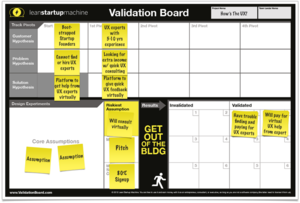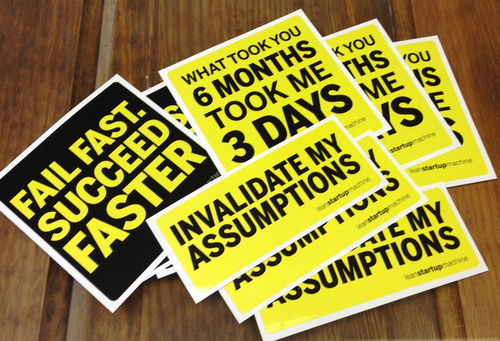Organization:Lean Startup Machine
Contents
Overview
The Lean Startup Machine, the world famous workshop and educational series on building a successful business in three days, is globally available in all major cities and features global partners such as Microsoft Ventures and Elance. This conslultingorganizationwas founded in 2010, some of its reviews include:
"The Lean Startup Machine was a synthesis of a lot of my frustrations with how the companies I've worked for over the past few years have created products and showed me that a much better way was possible. A hugely eye-opening experience for me, and I had a blast working with really smart, energetic people."
"These type of events changed my life, it is amazing what a simple community push can do for you. Discover what you can do, and who you love doing it with."
https://www.youtube.com/watch?v=XcdyHuGvzbU
The Lean Startup Machine has helped tens of thousands of individuals in hundreds of cities around the world make strides towards their goal by showing them where their ideas fail and fall apart.
Lean Startup Machine (LSM) is service by popular demand: if enough people call, they’ll come. Working on a vote based system, cities are ‘unlocked’ for an event if enough people vote for the city to hold an event. Fromthereorganizers are selected and an event is organized. Their intensive 3-day workshop is a startup boot camp that teaches the Lean Startup methodology of rapidly validating your assumptions and meeting with potential customers. It is designed to help entrepreneurs and innovators learn how to develop disruptive products from the best startup mentors in the community.
Purpose
Lean Startup machine hopes you fail fast and succeed faster.
At the beginning of each weekend, people pitch NEW ideas. Teams then self-select around particular ideas anddevelopsa problem, a solution hypothesis and a series of assumptions on which a company’s success would predicate. Rather than spend weeks developing a complete design, each team spends a few hours to create an "Minimum Viable Product" (MVP) which they use to demonstrate their idea to real customers and validate their assumptions and hypotheses by collecting cash and non-monetary currency to serve as validation.
With customer feedback, teams then regroup to pivot the design with their new insights in hand. The process promotes a problem-centric approach to business ideation. By continuously validating and invalidating assumptions, teams are forced to determine true customer pains; rather than finding a group whose problem matches their solution.
The event culminates in a competition where each team pitches their new solutions and experiences using the process. The team which honors the process and gains the most insights through its pivots is selected as the winner of the weekend.
Distinct Differences from other Offerings
The SWOT approach can be used to analyze this offering. With this in mind, strengths, weaknesses, opportunities, and threats are analyzed.
Strengths of the programfeaturesthe fact that the program not only offers help in building up a business into a strategic and efficient entity, but simultaneously provides training in product development and design thinking that takes a customer hypothesis, turns it into problem hypothesis, and arrives at the solution hypothesis. This starting process is then repeated for 1st Pivot, 2nd Pivot, etc. After performing design experiments, the goal is to arrive at validated and/or invalidated results. The program as a whole has also demonstrated its ability to be replicated across the nation, which is something many accelerators struggle with.
Another key point of difference and strength is the duration of the workshop. Because ofit’sintermediate length, there is sufficient time to cram in a lot of information while making the program shorter than say a 10 week or summer longproject. The workshop gives its users the appropriate footing to take off once they leave on the third day. To compare this to programs such as I-Corp or The Commons, Milwaukee startup accelerators, which take about 10 once-a-week meetups to complete, they are able to get a company off of the ground and running in a matter of three consecutive days. This allows companies and users to get in and get out with precision, so they can continue on with their expansion as soon as possible.
Weaknesses of the program are not apparent, but the weaknesses of their website and staff are apparent. The website assumes that its audience has some minor background in business. Coming from a different field of expertise, this poses a challenge for companies that don't necessarily have business representatives. This is by no means a good thing, particularly when combined with the fact that upon requesting their offered materials, they have not sent them to me at all. Dealing solely with the concise information on the website, the program is not as clear as it could be with a few minor improvements.
Opportunities that may improve this resource would be excellent customer support, improving the ease of access to information on the organization, such as providing accessible and available email addresses or email contact forms, transcribing their Validation Board (see bottom of the section) into a verbalized set of steps, while not revealing full details of the program, with the purposes of still maintaining customer interest in them.
Threats that may arise would be any potential government bills, larger consulting companies that are more renowned, or competition that is available on the consulting market (such as more competitive offerings in terms of quality, approach, and cost).
Impact Achieved For Students and Campus
There are fewer documented cases of the Lean Startup Machine taking place directly on campuses, although the program does encourage students to attend their workshops off campus and even offers a discount for students. Even though the LSM workshops are not commonly hosted on universities, that does not mean that the Lean Startup Machine programs are not beneficial for students. The LSM program has the potential to have a widespread positive impact if brought to Universities and offered directly to students, faculty, and staff.
The Lean Startup Machine would provide business-oriented students with entrepreneurial training and lead non-business students to get a glimpse into what it takes to develop a successful business upon startup. The skills acquired through the successful completion of the program will give students a jump start into transforming their ideas into successful business endeavors, and how to approach product or service improvements in order to make their business disruptive, and thus infinitely competitive.
For faculty and staff members, the goal of a Lean Startup training would be improving the competitiveness of certain aspects of an educational ecosystem. This could mean that through using Lean Startup Machine entrepreneurial techniques, the team of university employees would be trained in how to improve and innovate their approach to the university product - education. By innovating a learning environment, and reflecting on the university's SWOT landscape, the university is able to improve bottom-up, by first improving the teaching methods, educational and design spaces, and the performance of their students. Ultimately, this should serve to attract even more competitive students to attend this particular institution, which will, in turn, have even better methods for shaping them into outstanding individuals.
Steps Required To Bring Resource to Campus
1. Unlock Your City: This is the most difficult step. Each city requires a certain number of votes to be ‘unlocked’. Individuals in the Columbus area can register their emails to indicate they would like an event to take place in Columbus. Only when a certain number of individuals have voted is it possible to host an event in a city. Check out their website https://www.leanstartupmachine.com to find your city and see where your progress is.
2. When you have registered on the website, you gain access to program descriptions, the LSM Experiment board, a job board (coming soon), as well as access to the organization's blog.
3. Get Some Help: LSM requires five media partners, and six 'evangelists' to spread the word that Lean Startup Machine is coming to your city! Once a city receives the required number of unlocks, then an organizer is selected from the Lead Evangelists to set up the event.
6. LSM rewards their event organizers by returning 20% of the profits to the organizer in the city.
7. LSM helps set key deadlines for selling tickets to ensure the best event possible.
8. Qualify Mentors & Speakers: LSM's curriculum will help you assess mentors and speakers to make sure they’re top tier for the event. LSM promises to source experts from their global network.
Contact Information
Unlock your city:https://www.leanstartupmachine.com
For further inquiries contact:drew@leanstartupmachine.com
Facebook:https://www.facebook.com/leanstartupmachine
Twitter:https://twitter.com/lean
Tumblr:http://leancommunity.tumblr.com
Trevor Owens, CEO and Founder. Connect on LinkedIn:http://www.linkedin.com/in/owenstrevor

